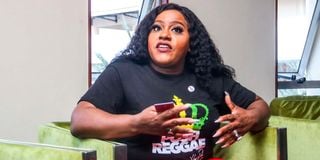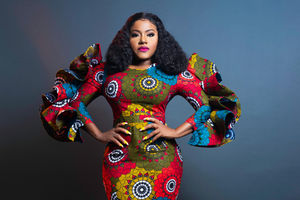
Jamaican Reggae artiste Etana speaks during an interview on December 8, 2024 at Movenpick Hotel in Nairobi.
In her songs, Shauna McKenzie, known by her stage name Etana, the Jamaican reggae dancehall musician who had made headlines in Kenya for the wrong reasons, cuts the figure of a gentle bird. So does she in person.
When Lifestyle meets her at the Mövenpick Hotel in Nairobi after the weekend's events, she barely raises her voice even when pushing across an argument.
This marks her fourth trip to Kenya, where she has planned a series of sold-out concerts in Nairobi, Mombasa, and Eldoret. But what draws her to Kenya?
“Kenyans love reggae music just like Jamaicans. In many ways, we’re the same people, just speaking different languages. I love the Kenyan audience because of how they sing along at concerts and their deep passion for the music," she says with a bundle of energy, eloquence and fierce passion for reggae.
Her introduction to music was first as a background vocalist for Richie Spice. She eventually wrote her first song, which took her around six months.
“The song was called Wrong Address. It got me popular, and that was my introduction to the world,” she says.
Her music, she says, is inspired by her love and passion for people and her desire to inspire.
“When I started music, my main intention was to inspire, to uplift, and to make people's journeys lighter with music,” she says, drawing inspiration from Bob Marley, Jimmy Cliff and Sizzla Kalonji.
Reggae fans
She soon became a darling of reggae fans, especially in Kenya.
"The first time I came to Kenya was in 2012; I was about six months pregnant. I never knew fans would sing along that hard. They didn't even care about my belly," she told Lifestyle in a past interview.
Her Nairobi show, scheduled for last Saturday, was postponed, creating a media storm after a clash with Diamond Platnumz’s event. The two-time Grammy nominee voiced her displeasure, leading to public tension.
Will her planned tours to Mombasa and Eldoret continue as scheduled?
“Yes, they will go on as planned on December 14. We will have a new show in Nairobi to replace the one that was bamboozled, with the venue to be communicated. All tickets that were purchased for the postponed concert will be honoured in this subsequent show,” she says.
She says her performance had been promoted long before the Diamond Platnumz event was hyped right next to the venue where her show was to happen.
“When we saw the other show pop up, we didn’t think it was a problem because my audience is different; the people who listen to my music may not necessarily be listeners of Diamond and vice versa. We are two different artistes so I wasn’t worried,” she says.
“My promoter was later told that the two shows could not be held in the same area because of security reasons. If the issue was the safety of the people [revellers], this should have been communicated a long time ago,” she argues.
“I believe Diamond Platnumz's show was to disrupt my event. They put up their show, and when they realised they were not pulling in an audience from mine in terms of ticket sales, they decided to cut off my show altogether...”
“I am an independent artiste and they have a label-signed artiste. For a label-signed artiste to show up and look smaller than an independent artiste, it isn’t so good on the label side and so the best thing to do is to sabotage my show to make the label artiste look better,” she adds.
“Nobody would go through all that length for no reason; it costs time and money. If you were a promoter putting up a show to make money, you wouldn't put a show right down the street from another event,” she says.
On the allegations of having a terse standoff with Diamond Platinumz’s fans, she says, “It is a normal thing in Jamaica for an artiste to show up with 30 to 40 men tagging along. When I first started music, I used to do that. But right now, I'm grown, I'm established, and I don’t need the force of man behind me. When you have the love of the people [fans], you don’t need that. Especially when you are showing up at a TV station, a show of force is largely unnecessary. Is it for the TV people or for that one woman, and why do you think that one woman needs all that, are you all that afraid of one person?”
Does she feel the abrupt cancellation can dent her stardom?
“If you are confident in your own works...,” she says.
Male-dominated genre
We steer the conversation back to her longevity, especially in a male-dominated genre.
“I don’t think male or female; I just think about where I'm going. I grew up with boys, and many male cousins... we grew up with fights, and I became tough,” she says, "I don’t get intimidated easily, especially when I know what I want."
While she exudes a soft and gentle persona, Etana is clear she is never the type to be pushed around.
“I come off as cute and gentle, but when you agitate a lion, it will show you that you are out of line. Same with me. Most times, I'm very kind, loving, caring, and sharing, but there is another side, as is with everyone; when you push far enough, they will react,” she says with a laugh.
She acknowledges the challenges of being a woman in reggae. “You have to love yourself and stay focused on your goals. Don’t let anyone sway you. Set a vision, stay true to it, and never put yourself in a position you’ll regret."
"Look five years ahead on whether you'll be able to live with your decision today. Never put yourself in a position where you will regret it. Remember the soul first,” she adds.
Did she ever feel overshadowed singing as a background vocalist for Richie Spice?
“I never was concerned about getting overshadowed because I was comfortable where I was, being a background vocalist. After my first song was released, though, the management team decided that I could not be on the same stage with Richie Spice anymore because then one of us would overshadow the other, and so they split us apart,” she says.
Reggae and marijuana
On why she thinks Kenyans love reggae as she does, Etana believes reggae has universal appeal because it reflects real-life stories.
“We experience similar struggles, and reggae tells our story,” she explains. "It speaks about love, trials, and triumphs, and gives us strength to fight for our rights and uplift each other. Reggae especially speaks to the poor, those stuck in the slums, what we call the garrison, and people who are fighting for a better life."
What about marijuana and reggae? I ask. Etana shares her thoughts on its historical significance.
“Ganja has many healing properties beyond smoking. Bob Marley and Peter Tosh used it as a form of rebellion, particularly because marijuana was restricted to Black people. Back then, anything that could help Black people prosper was fought against. If you took out a spliff [a cannabis cigarette] and lit it back in the day, you would be beaten and jailed,” she says.
She points out the irony of modern-day marijuana legalisation: “Countries are now profiting from it, but so many people suffered and were incarcerated for it in the past. That’s the absurdity of it. Bob Marley and Peter Tosh knew the plant’s power, but smoking it was just the most rebellious way to talk about it."
"This was the same thing with sugarcane and rum when the slaves were making the Moonshine [ homemade, unaged whisky],; it became illegal; you were not allowed to have anything to build and to trade with, and the rule was you do as we say while we profit off of you,” she says.
On doing collaborations with Kenyan artistes, she says she worked with three Kenyan male artistes and is looking forward to working with a female one. Who that female artiste is, she does not know yet, but she hopes to make some connections and see what works.
Her parting shot?
“You have to remember that the power of the people speaks volumes.”










